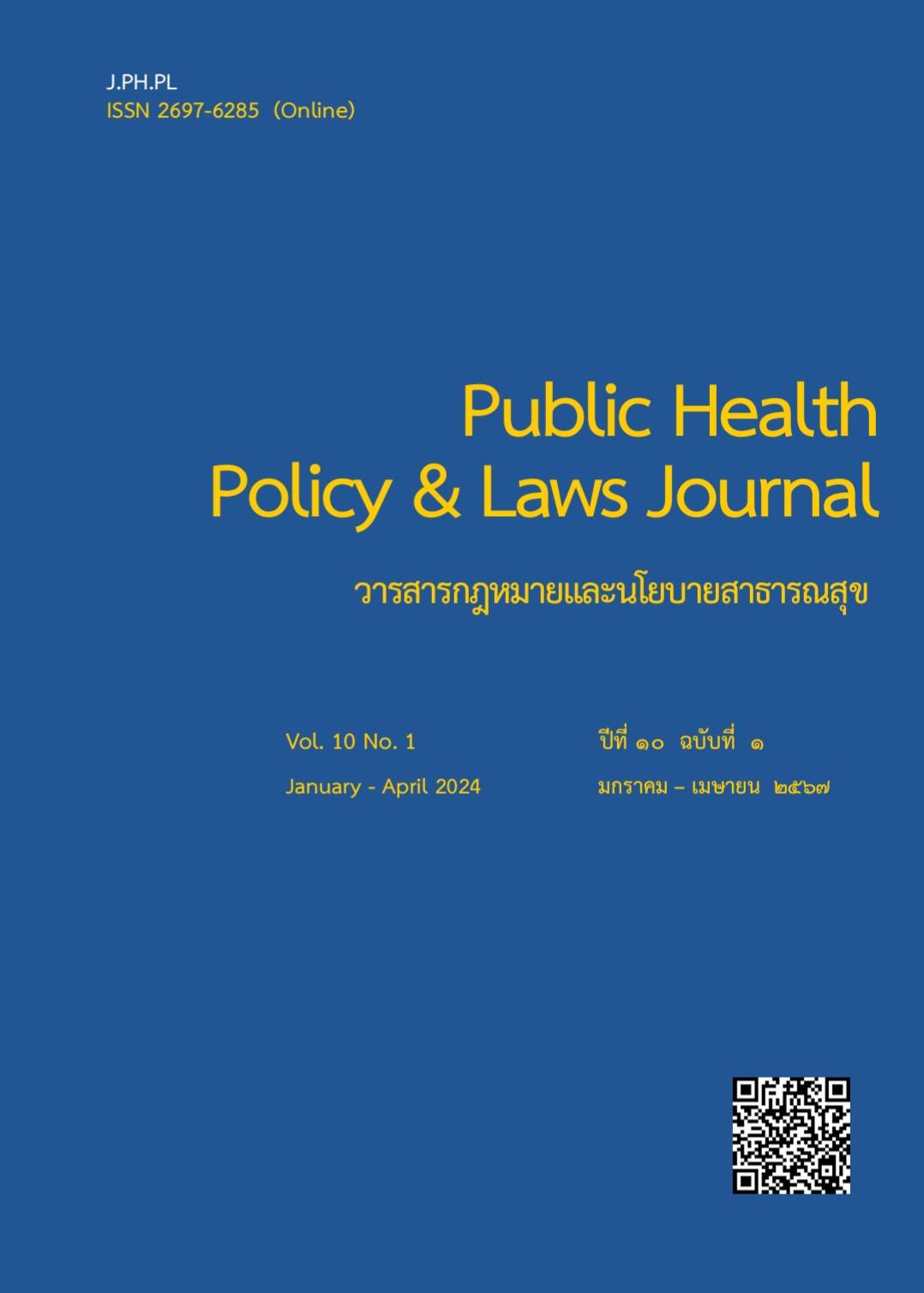Problems and guidelines for controlling alcoholic beverages
Keywords:
Alcohol drinking problems, alcoholic beverages control, marketing communication, alcohol addictsAbstract
Due to the Alcoholic Beverage Act of 2008, problems arise in enforcing the law. There is a situation where many agencies wish to amend the law. This article aims to present the issue of the effects of drinking alcohol, alcohol control, and guidelines for amending the law that the Ministry of Public Health intends to address through six important points: 1) Definition of alcoholic beverages referring to the Liquor Act of 1950, which was later repealed by the Excise Tax Act, B.E. 2560, may cause problems when the law is amended in the future. 2) There is a committee system for driving the alcohol control implementation process. The committee is responsible for providing policy guidelines, as well as determining various measures to achieve the success of alcohol control, in accordance with various strategic plans. Implementation of the laws at the local level in a concrete manner and having an effective monitoring system. 3) There are problems with the interpretation of the terms "advertising" and "marketing communication" and issues with law enforcement, such as in the case of traditional celebrations, with exceptions for weddings and diplomatic ceremonies only. 4) Funding or sponsoring activities that provide opportunities for corporate image may directly and indirectly stimulate and cultivate a positive corporate image for children and youth, who will become new drinkers. 5) Promoting and supporting the treatment or rehabilitation of alcohol addicts or those with alcohol consumption problems. This is to promote the good health and well-being of the people. 6) Amendment of penalties appropriately for the current situation. For manufacturers and importers of alcoholic beverages, the penalty is twice as much as for individual violators.
References
Boonyu Khorphonprasert, (2019) Public perception of alcoholic beverage advertising through the DNA brand and similar symbols. Public Health Ministry.
Center of Alcohol Studies. (2019) Situation of alcohol consumption in Thailand and the world 2016 – 2018, Epidemiology Unit Faculty of Medicine Prince of Songkla University.
Center of Alcohol Studies. (2020) reports on the situation of alcohol control policy implementation in Thailand between 2008 - 2018 under the project “Joint Assessment Mission to Review Alcohol Control Policy and Strategy in Thailand”.
Center of Alcohol Studies. (2010) Alcohol situation report for the year 2010.
International Health Policy Development Office, 2017, Report on the burden of disease and injury in the Thai population 2014.
Kanitha Thaikla, (2018) Newsletter, Ten Years of the Alcoholic Beverage Control Act 2008: What is Thailand?” at the 10th National Liquor Academic Conference, 21 - 22 November 2018, at Century Park Hotel. Bangkok.
Niphon Chinanonwet. (2020). The role of the government in controlling alcoholic beverages. Office of the Alcoholic Beverage Control Commission. http://cas.or.th/cas/wp-content/uploads/2019/04/ACFrOgAfyWyxjQOc 3VpqFBjXNy488Zh7KCIgyJZ7QU3HpYY5mscG5Mg8OjEkd7VvlhsBrjtop5wOHhcbQffZU5800l_SemtnQhn3IJGoc_blExLBvykL gW37U-uhv643U_C9f5VGha1EjP3jNv2o.pdf
Nithat Sirichotiratana (2011), Review of knowledge on the complete ban on advertising of alcoholic beverage products, Public Health Journal Department of Public Health Administration Faculty of Public Health, Mahidol University, Year 41, Issue 3, September - December 2011, 270 - 282
Nithat Sirichotiratana and Chardsumon Prutipinyo, (2017) Complete ban on advertising of alcoholic beverages. Research report, Center of Alcohol Studies.
Oratai Waliwong, Taksapon Thamrangsi and Jintana Chankhotkaew (2014) Effects of drinking alcohol on others: Situational concept. and knowledge gaps in Thailand, Public Health System Research Journal, Year 8, Issue 2, April - June 2014, 111 - 113
Orathai Waliwong, Kamonpat Makchaeng, and Chananchida Buathong, August (2021) Summary of important academic information on measures for alcohol marketing activities to protect children and youth in the digital age and world of free trade.Ihpp.
Srirat Loisamut (2018) Looking ahead and behind, following trends, revealing every issue: In-depth look at alcohol business strategies over the past 3 years. Center of Alcohol Studies.
Suwara Kaewnui, Taksaphon Thamrangsi, Sopit Nasueb and Prapak Neramitpitakkul. Screening, treatment, and rehabilitation of people with alcohol use problems: gaps under the universal health coverage system. Journal of Health System Research, Year 5, Issue 4, 2011
Thaksaphon Thamrangsi. (2014) Report on the situation of NCDs, health crisis, social crisis. 1st edition. Nonthaburi: Health Promotion Policy Research Office; 2014.
Thatchanan Komonpaisarn. (2019). Assessing the social impact costs of alcohol consumption in Thailand.
Wanna Yongpisanphob (2021) Industrial business trends 2019-2021: beverage industry. Retrieved on 5 September 2021, https://www.krungsri.com/th/research/industry/industry-outlook/Food-Beverage/ Beverage/IO/io-beverage20-th
United Nations, “Sustainable Development Goals: SDGs”. Accessed September 16, 2021, https://sustainabledevelopment.un.org/?menu=1300
Downloads
Published
How to Cite
Issue
Section
License
Disclaimer and Copyright Notice
The content and information presented in articles published in the Journal of Law and Public Health Policy represent the opinions and sole responsibility of the respective authors. The editorial board does not necessarily agree with or assume any responsibility for the views expressed.
All articles, data, content, images, and other materials published in the Journal of Law and Public Health Policy are the intellectual property of the journal. Any individual or organization wishing to reproduce, distribute, or otherwise use the entirety or any part of such materials must provide proper citation.





